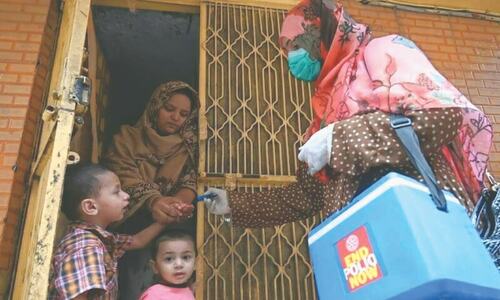ISLAMABAD: Health experts have blamed the lack of coordination between the federal and the provincial governments for the resurgence of polio cases in the country, saying the decision to hand over the anti-polio programme to ‘outsiders’ from the global health agencies in 2021 exacerbated the situation.
In this year, over 100 environmental samples have been found positive for polio and two children have been paralysed due to this virus. According to experts who spoke to Dawn on the condition of anonymity, the virus was on the verge of eradication in 2021 but “some international agencies took over the programme just to claim the credit” — a move which backfired. They warned that besides operational issues, the lack of coordination between the centre and provinces may increase the polio cases again.
A polio expert, wishing not to be named, said that there was an interesting debate about polio these days but nobody was mentioning the fact that the programme was “snatched” from the government in 2021 when there was only one case and zero environmental detections over several months.
In 2019, as many as 147 polio cases were reported but in 2020 the number dropped to 84. After reporting a single case in 2021, the cases started to increase again: 20 cases were reported in 2022 and six cases were reported in 2023.
Experts say decision to hand over the programme to global health bodies in 2021 backfired; official claims govt still in charge
“…the virus interruption looked imminent due to simultaneous focus on supplementary immunisation activities (SIAs) as well as the Expanded Programme on Immunisation (EPI) coverage, especially in core reservoirs of Karachi, Peshawar and Quetta blocks as well as other vulnerable zones. The most critical factor for this unprecedented success was the unified leadership of the EPI and Polio Eradication Initiative (PEI) at the national level,” the expert said.
They said that instead of continuing with a competent government officer, the operations of the programme were handed over to individuals outside the country, resulting in the loss of government control.
“With the loss of the government control, no NEAP [national emergency action plan] was ever developed, so efforts got fragmented. Virus rang alarm in south KP during 2022 and the real surge started in 2023 with 126 environmental samples detections from 28 districts. Situation worsening with 110 detections from 33 districts in 2024 so far,” he said. It is worth mentioning that if a virus is detected in the sewage water the sample is called “positive”.
He said that there was just a glimpse of gains in EPI during the short span of time during the Covid-19 pandemic. According to an independent nationwide survey by Aga Khan University (AKU), the proportion of fully immunised children went up by over 10pc nationally.
Another expert, requesting anonymity, said that the polio programme was getting unprecedented cooperation and support from the army and LEAs.
“I remember that over a decade back we were having suicide attacks almost every day, even in the urban areas… but today the situation is very much improved. There are no such security issues and most parts of the country are accessible,” he claimed.
Former caretaker minister Dr Nadeem Jan, while talking to Dawn, said that the virus that travelled from Afghanistan to Pakistan changed the situation. “While I was caretaker health minister, I involved the religious scholars, sent experts in erstwhile Fata and then premier Anwaarul Haq Kakar chaired three meetings of the National Task Force on Polio.”
He said the polio programme should hold “aggressive campaigns to develop herd immunity”.
Dr Shahzad Baig, the coordinator of the National Emergency Operations Centre (NEOC), told Dawn that almost 200 strategies were developed by the polio programme. “We hold polio campaigns wherever environmental samples are reported and even trace the path of the virus and hold campaigns there. We have also established transit points at the entry and exit of cities, railway stations and borders to ensure vaccination of every child,” he said, calling the “refusals” a major obstacle in the programme.
Dr Baig said that the government was leading the polio programme and assured all possible steps would be taken to eradicate the virus. He claimed the government was in the driving seat since 2011, contrary to the claims made by the experts.
“Before 2011, the polio programme was being run by EPI but then on the recommendation of the Independent Monitoring Board (IMB)the government took the lead and stopped the involvement of bureaucracy. Then NEOC was established and it was decided all the stakeholders would sit together,” he said, adding that he joined the programme in 2021 and only a single case was reported in that year.
In 2022, as many as 20 cases, six cases in 2023, and only two cases were reported in this year, he added.
It is worth mentioning that polio is a highly infectious disease caused by poliovirus mainly affecting children under the age of five years.
It invades the nervous system and can cause paralysis or even death. While there is no cure for polio, vaccination is the most effective way to protect children from this crippling disease.
Published in Dawn, May 3rd, 2024














































Dear visitor, the comments section is undergoing an overhaul and will return soon.